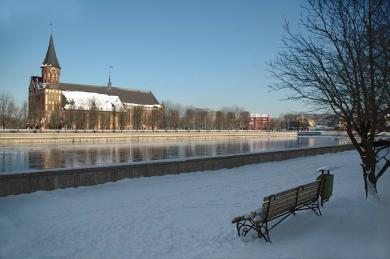
Putin’s “Power Vertical” Doesn’t Leave Other Ties to Keep Russia Together
Publication: Eurasia Daily Monitor Volume: 6 Issue: 37
By:

"As a scholar, I establish the fact that the Russian Federation is developing signs of the initial stage of a breakup," Professor Alexei Malashenko, Scholar-in-Residence of the Carnegie Moscow Center, told Jamestown on February 12. "Not unlike the case of the USSR, the current economic crisis threatens to bring already badly strained internal ties to the breaking point."
The first parts to break away, Malashenko believes, will be the Kaliningrad enclave, wedged between Poland, Lithuania, and Belarus and firmly oriented to Europe, and the Far East on the opposite side of this country, firmly locked economically to China, Japan, and South Korea.
The Kaliningrad region and the Far East have as little in common within the Russian Federation as, say, Estonia and Turkmenistan did in the Soviet Union. No viable economic ties exist between the extremes of this large country. There is nothing like Route 1 from Key West, Florida, to Fort Kent on the Canadian border to link Kaliningrad to Vladivostok. Only centralized control, known as Putin’s vertical of power, has kept Russian regions together like hoops on a cask. As the systemic crisis loosens the hoops, however, the decayed cask will start falling apart.
On February 9 the Republic of Tuva, which borders Mongolia in Eastern Siberia (and of whose existence most Muscovites are only dimly aware), challenged a key element of this power vertical. Under Putin, regional legislatures just rubber-stamp Moscow’s "recommended" presidents and governors (just as Soviet Communist party regional committees "elected" Moscow’s "recommended" first secretaries). The central government appoints the key officials of federal agencies in the regions, regardless of local feelings. Tuva now wants Moscow to seek regional approval for such appointments (www.kommersant.ru/doc.aspx?<wbr></wbr>DocsID=1116295&NodesID=2).
Although the legislation initiated by Tuva will most likely die on the Duma floor, it does reflect the longstanding anger that has been smoldering in the regions as Putin has been turning the Russian Federation into a unitary state. This anger just broke out in a dangerous way in Dagestan. On February 2 Moscow appointed Vladimir Radchenko to head the Dagestan Republican Directorate of the Federal Internal Revenue Service (UFNS).
On February 3 Radchenko could not enter Dagestan, because a large crowd of protesting Lezgins, Dagestan’s third-largest ethnic group, would not let him in. The Lezgins have a claim on the UFNS under an informal delineation of powers in the multi-ethnic republic (www.rosbalt.ru/2009/02/03/<wbr></wbr>614914.html).
Only on February 6 was Radchenko able to make his way into the UFNS headquarters in Makhachkala. He did not stay long, however. Two gunmen broke in, threatened him with guns, grabbed him, and threw him into a car. The kidnappers told Radchenko that they would kill him if he did not leave Dagestan and then just dumped him in the downtown area (www.interfax.ru/politics/<wbr></wbr>news.asp?id=62243). Radchenko left the republic (www.gazeta.ru/politics/2009/<wbr></wbr>02/11_a_2940547.shtml).
Radchenko’s lawyer, Murad Karikhmanov, quoted his client as saying that it was his UFNS deputy Gadzhimurat Aliev, a son of Dagestan President Mukhu Aliev, who led the opposition to block Moscow’s appointee from assuming office (www.kavkaz-uzel.ru/articles/<wbr></wbr>149452). Moscow had to swallow this bitter pill to avoid provoking more confrontations in restive Dagestan.
Meanwhile, on February 11 the Moscow-based daily Moskovskiy Komsomolets (MK) published a story titled "Diamond Luster: Who Is Tearing Sakha out of Russia?" The Republic of Sakha-Yakutia has 90 percent of all of Russia’s diamonds and 30 percent of its natural gas reserves, oil, as well as other riches. The MK story cites numerous stories "regularly appearing on popular Yakutian [Internet] sites and calling almost directly for secession from Russia." MK frets that "American sites pick up these stories." MK accuses Afanasi Maksimov, a local millionaire-entrepreneur and a deputy of the republican legislature of launching this "Independence for Yakutia" campaign and "fanning up the enmity" toward the central government as a defense against possible criminal prosecution for his numerous misdemeanors. That might well be; but MK also refers to local dissidents who insist that the federal center "beats and humiliates Yakutia."
Increased confrontation in Yakutia is indicative of growing centrifugal tension in Russia, held dormant under Putin’s heel since the late 1990s but never resolved politically or economically.
During the economic crisis of the 1990s, Russian regions walled up, either banning exports to neighbors—Krasnodarsky Krai banned selling its grain to other Russian regions-or banning imports from its neighbors—Tatarstan banned vodka imports from other Russian regions. Internal customs houses, banned by Empress Elisabeth in 1754, sprang into being again. On February 3 the Moscow-based Kommersant reported that since January 15, Tatarstan had again banned vodka imports from other Russian regions.
A key factor that could unite a country in crisis is its citizens’ right to self-government and self-organization. Putin’s power vertical, however, is aimed at nipping any attempts at such self-determination in the bud. On May 20, 2005, then-FSB Director Nikolai Patrushev flatly stated that NGOs working in Russia threatened the country’s security (www.newsru.com/russia/<wbr></wbr>20may2005/janes.html). On January 10, 2006, then-President Putin signed a law that severely curtailed NGOs’ activities and placed them under stringent state control (www.finmarket.ru/z/nws/<wbr></wbr>hotnews.asp?id=452332&nt=).
Oleg Panfilov, a noted scholar and human rights activist, told Jamestown on February 13, "With economic ties broken and self-organization traditionally suppressed, the rotten barrel of Putin’s state indeed risks falling apart, once the authoritarian hoops strain to the breaking point."




